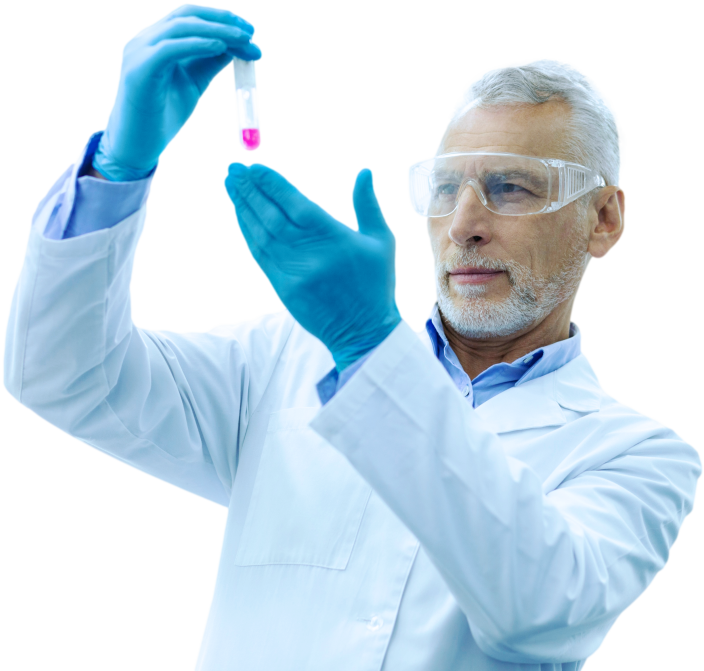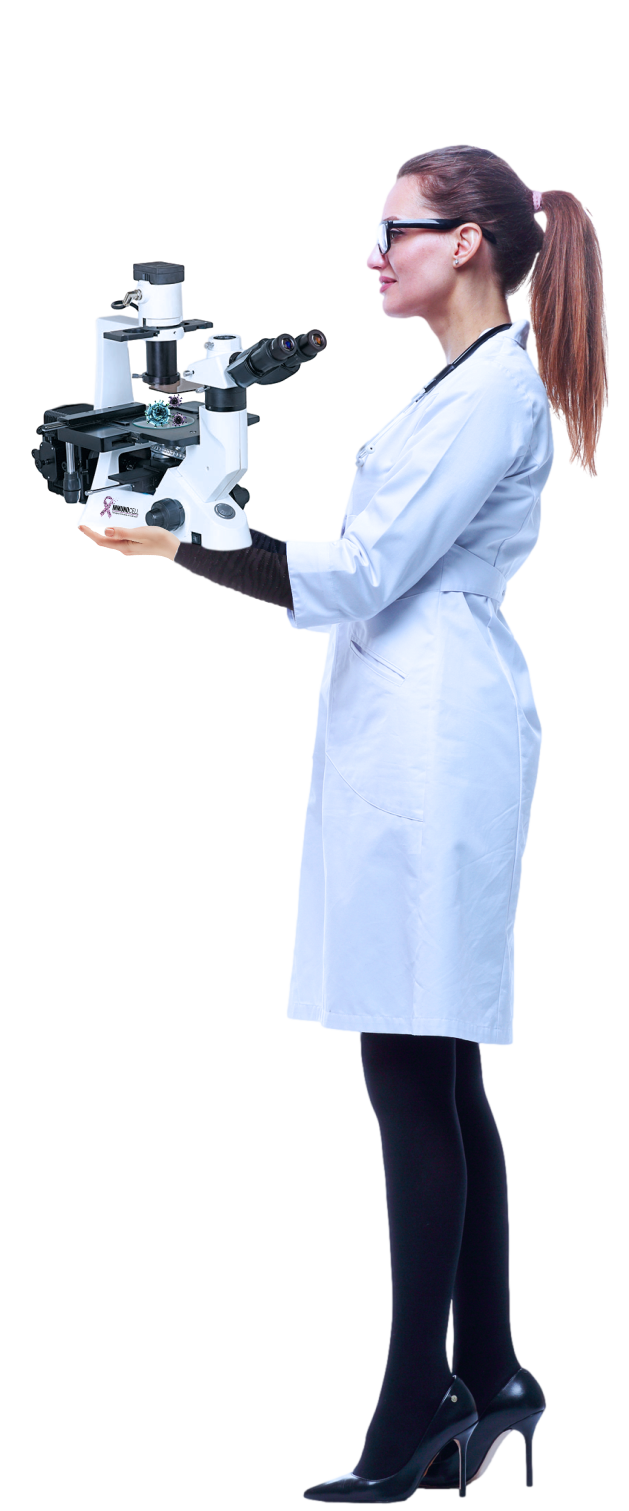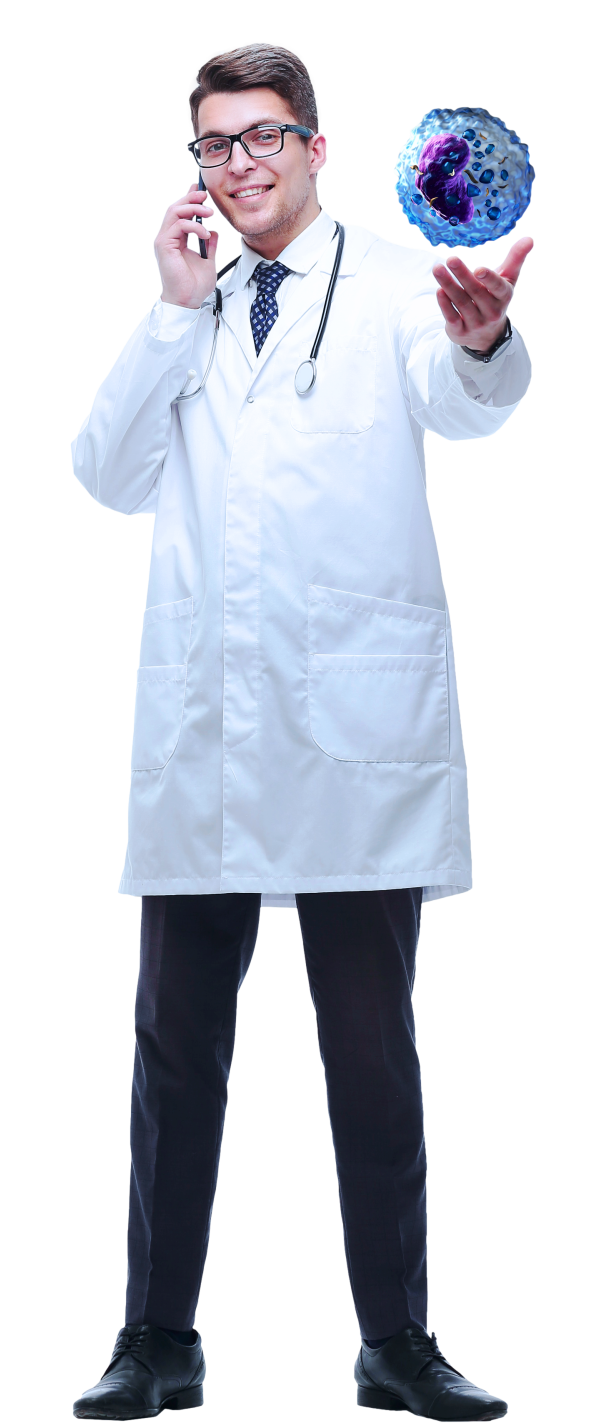
2011 Nobel Prize in Medicine, dendritic cells and their immune role
Biomedicine is a fascinating field that utilizes biological principles for the treatment of diseases and is based on the understanding of the underlying biology of a disease.
Biomedical research has led to significant advancements in the understanding of the human body and new approaches for a wide range of diseases.
At Inmunocell, as a specialized healthcare clinic, we are at the forefront of research in advanced medicine and biotechnological developments in order to provide our patients with the best treatment options available.
INMUNOCELL Therapy
Against Cancer

Adjuvant therapy against cancer is an emerging approach aimed at strengthening the patient's immune system and improving the response to conventional treatments such as surgery, chemotherapy, or radiation therapy.
This type of biological therapy presents an invaluable therapeutic opportunity for a wide range of tumor conditions, including some that would otherwise not have access to such advances.
Although each case requires individual evaluation, the main types of tumor conditions that can be treated include the following:

One of the major advantages of these procedures lies in the fact that the hard work is carried out in the laboratory, rather than directly in the patient's body.
Being a biological therapy, personalized for the patient with elements from their own immune system, there are no side effects associated with conventional drugs.
It provides a unique advantage: the opportunity to create an immune response that remains in the patient in the long term.
It is one of the only therapies applicable at virtually all stages of the disease, including metastatic dissemination.

A new approach to tackling diseases
Regenerative Medicine

Viability by type of condition

These new therapeutic approaches offer alternatives for treating a wide range of medical conditions, including those of autoimmune, neurological, inflammatory, or orthopedic origin, as well as those associated with traumatic injuries.
At Inmunocell, we integrate specialized procedures—grounded in safety standards and evidence-based criteria—to address conditions such as:
Chronic autoimmune disease in which the body's immune system attacks healthy tissues, which can affect various organs and systems of the body.
Chronic inflammatory disease of the gastrointestinal tract that can affect any part of the digestive system, causing a wide range of symptoms.
Myocardial Infarction, commonly known as a heart attack, is a serious condition that occurs when blood flow to the heart is suddenly interrupted, which can result in damage to the heart muscle.
Multiple sclerosis (MS) is a chronic autoimmune disease of the central nervous system that affects the myelin, the protective covering of nerve fibers.
A condition characterized by hair loss in one or more areas of the scalp. Alopecia can have a significant impact on the self-esteem and confidence of the affected person.
Inflammatory bowel disease that affects the lining of the colon and rectum. It is characterized by the presence of ulcers and erosions in the mucosa of the large intestine, leading to symptoms such as bloody diarrhea, abdominal pain, weight loss, fever, and fatigue.
Chronic disease characterized by elevated blood glucose levels due to either insufficient production of insulin by the pancreas or the body's inability to effectively use the insulin produced. There are two main types of diabetes.
Arthritis is a general term that refers to the inflammation of one or more joints in the body.
It can affect people of all ages, although it is more common in individuals over the age of 65. There are many different types of arthritis, but the most common ones are osteoarthritis and rheumatoid arthritis.
Neuropathy refers to a disease or damage to the nerves that connect the brain and spinal cord to other parts of the body. This condition can affect sensory, motor, or autonomic nerves and can have various causes and symptoms.
Parkinson's disease is a chronic neurodegenerative disorder that primarily affects the central nervous system. It is characterized by the progressive degeneration of nerve cells in a region of the brain called the substantia nigra.
This degeneration leads to a decrease in the production of dopamine, a neurotransmitter that is important for the control of movement and muscle coordination.
Common injury in which the tendons of the rotator cuff, a group of muscles and tendons that surround the shoulder joint, become inflamed and cause pain.


Our protocols aim to restore the body’s function at the cellular level by renewing tissues and organs. Among the main mechanisms of action, we highlight:
Balances the immune system to reduce harmful inflammation without compromising beneficial protection. It works by organizing cytokine signaling and promoting regulatory cells; it decreases inflammatory mediators, modulates neuroinflammation and pain, and improves cellular energy utilization.
Applicable to autoimmune diseases (lupus, rheumatoid arthritis). Inflammatory bowel diseases (Crohn’s disease, colitis, ulcerative colitis). Chronic inflammatory or neuropathic pain; inflammatory dermatologic conditions (psoriasis, dermatitis). Inflammation-mediated organ dysfunction (nephritis, autoimmune hepatitis).
Promotes the repair of damaged structures by activating the tissue microenvironment—promoting trophic factors, controlled angiogenesis, extracellular matrix remodeling, and reducing inflammation—to create more efficient healing conditions.
Applicable to musculoskeletal injuries (osteoarthritis, chondromalacia, tendinopathies, tears/partial tears, delayed bone union). Skin and soft tissues (diabetic and venous ulcers, complex and postoperative wounds, burns). Peripheral nerve (neuropathies, compressive injuries); cartilage, meniscus, local ischemia (post-ischemic tissue). Intestinal mucosa (fistulas, ulcers).
Allows the body to repair without excessive scarring by regulating how much collagen is deposited and how the extracellular matrix is organized, preventing stiff scars. It orchestrates the signals that guide cells to the injury site, coordinates their communication, and balances tissue remodeling so the tissue regains elasticity, mobility, and performance.
Applicable to hypertrophic scarring; capsular fibrosis and contractures (frozen shoulder, Dupuytren’s). Tendinopathies with fibrosis; adhesions and stenoses. Hepatic and renal fibrosis. Post-infarction myocardial fibrosis. Pulmonary fibrosis. Scleroderma and sclerosing dermatoses. Post-radiation fibrosis.
Promotes the recovery of true organ or system function by transforming and optimizing biological processes such as precise inflammation control, improved blood perfusion, cellular support, and metabolic balance. It restores homeostasis, protects tissue, and improves clinical performance.
Applicable in respiratory (COPD, post-infection fibrosis). Renal (nephritis, renal insufficiency). Hepatic (NASH, autoimmune hepatitis). Cardiovascular (post-infarction, heart failure, peripheral ischemia). Gastrointestinal (fistulas, malabsorption). Neurological (neuropathies, functional sequelae). Musculoskeletal (osteoarthritis, tendinopathies, postoperative). Cutaneous (chronic ulcers). Metabolic (insulin resistance, metabolic syndrome).
Advances in biomedicine around the world
News, reports, and innovation

2011 Nobel Prize in Medicine, dendritic cells and their immune role

Moravia, San Jose, Costa Rica.
Nueva York NY, Los Ángeles CA, Chicago IL, Houston TX, Phoenix AZ, Filadelfia PA, San Antonio TX, San Diego CA, Dallas TX, San José CA, Austin TX, Jacksonville FL, Fort Worth TX, Columbus OH, San Francisco CA, Charlotte NC, Indianápolis IN, Seattle WA, Denver CO, Washington D.C., Boston MA, El Paso TX, Detroit MI, Nashville TN, Memphis TN, Portland OR, Oklahoma City OK, Las Vegas NV, Louisville KY, Baltimore MD, Milwaukee WI, Albuquerque NM, Tucson AZ, Fresno CA, Sacramento CA, Kansas City MO, Mesa AZ, Atlanta GA, Colorado Springs CO, Raleigh NC, Omaha NE, Miami FL, Oakland CA, Minneapolis MN, Tulsa OK, Cleveland OH, Wichita KS, Arlington TX, Nueva Orleans LA, Bakersfield CA, Tampa FL, Honolulu HI, Anaheim CA, Aurora CO, Santa Ana CA, Corpus Christi TX, Riverside CA, St. Louis MO, Lexington KY, Pittsburgh PA

The information on this site is educational and does not replace an individual medical evaluation. The suitability of any biological/adjuvant protocol is determined case by case by a duly licensed medical professional in Costa Rica. No medical treatment can guarantee results or the complete absence of adverse effects.
Digital Communications:
By contacting us through digital channels—such as WhatsApp, the website chat window, email, etc.—you authorize the processing of your data (including health data) in accordance with our Privacy Policy and any necessary transfers to technology providers. You may exercise your rights of access, rectification, and deletion by writing to: info@inmunocell.com
Evidence and Clinical Studies:
The clinical studies referenced can be consulted at the sources indicated to review conditions such as population, endpoints, and limitations. Please note that a study is not directly extrapolable to your case; feasibility and expectations for any specific case will be assessed by a duly licensed medical professional in Costa Rica.